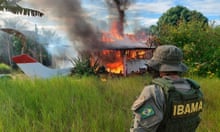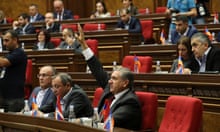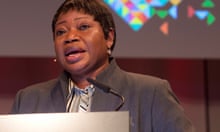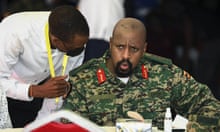Judges at the international criminal court (ICC) have authorised a full-scale investigation into allegations of mass persecution and crimes against humanity that forced at least 600,000 Rohingya Muslims to flee Myanmar into neighbouring Bangladesh.
The ruling, which sets a significant precedent in expanding the jurisdiction of the war crimes court, is the second move against Myanmar this week at international tribunals in The Hague.
On Monday, a submission was made by the Gambia to the international court of justice (ICJ) accusing Myanmar of genocide through the murder, rape and destruction of communities in the country’s western Rakhine state.
The ICC decision, announced on Thursday, follows a request by the court’s chief prosecutor, Fatou Bensouda, earlier this year for a formal investigation into alleged ethnic cleansing since 2016.
Myanmar is not a party to the Rome statute that established the ICC, but its neighbour, Bangladesh, has accepted the court’s jurisdiction.
By declaring that the ICC exercises jurisdiction over crimes where part of the alleged criminal conduct – in this case mass deportation – takes place on the territory of a state party, the ICC has extended its international law-enforcement role.
A similar argument has been presented at the ICC on behalf of Syrian refugees who have been forced to flee to neighbouring Jordan, which, like Bangladesh, is a signatory to the Rome statute.
Q&AWho are the Rohingya and what happened to them in Myanmar?
Show
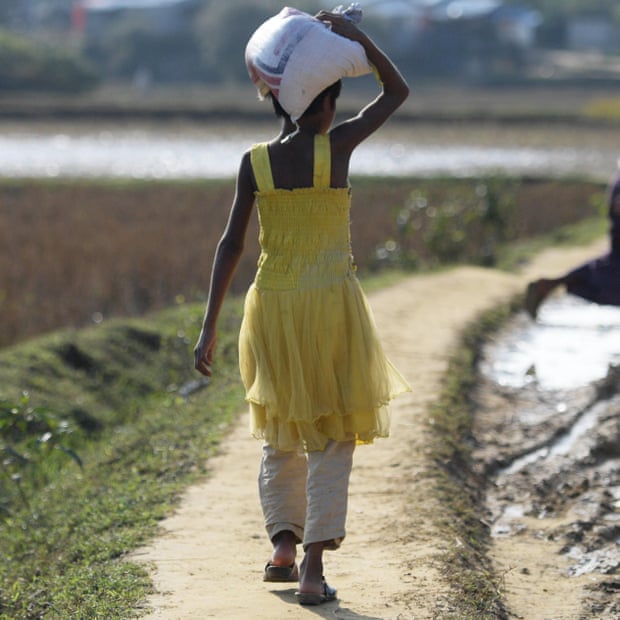
Described as the world’s most persecuted people, 1.1 million Rohingya people live in Myanmar. They live predominately in Rakhine state, where they have co-existed uneasily alongside Buddhists for decades.
Rohingya people say they are descendants of Muslims, perhaps Persian and Arab traders, who came to Myanmar generations ago. Unlike the Buddhist community, they speak a language similar to the Bengali dialect of Chittagong in Bangladesh.
The Rohingya are reviled by many in Myanmar as illegal immigrants and suffer from systematic discrimination. The Myanmar government treats them as stateless people, denying them citizenship. Stringent restrictions have been placed on Rohingya people’s freedom of movement, access to medical assistance, education and other basic services.
Violence broke out in northern Rakhine state in August 2017, when militants attacked government forces. In response, security forces supported by Buddhist militia launched a “clearance operation” that ultimately killed at least 1,000 people and forced more than 600,000 to flee their homes. The UN’s top human rights official said the military’s response was "clearly disproportionate” to insurgent attacks and warned that Myanmar’s treatment of its Rohingya minority appears to be a "textbook example” of ethnic cleansing.
When Aung San Suu Kyi rose to power there were high hopes that the Nobel peace prize winner would help heal Myanmar's entrenched ethnic divides. But she has been accused of standing by while violence is committed against the Rohingya.
In 2019, judges at the international criminal court authorised a full-scale investigation into the allegations of mass persecution and crimes against humanity. On 10 December 2019, the international court of justice in The Hague opened a case alleging genocide brought by the Gambia.
In its decision on Thursday, the ICC authorised the prosecutor to “proceed with an investigation for the alleged crimes within the ICC’s jurisdiction in the situation in the People’s Republic of Bangladesh/Republic of the Union of Myanmar”.
Three judges in the ICC’s pre-trial chamber, Judge Olga Herrera Carbuccia, Judge Robert Fremr and Judge Geoffrey Henderson, found “a reasonable basis to believe widespread and/or systematic acts of violence may have been committed that could qualify as the crimes against humanity of deportation across the Myanmar-Bangladesh border and persecution on grounds of ethnicity and/or religion against the Rohingya population”.
The chamber did not assess whether other associated war crimes may have been committed, but said they could nonetheless form part of the prosecutor’s future investigation.
Welcoming the ruling, Bensouda said: “This is a significant development, sending a positive signal to the victims of atrocity crimes in Myanmar and elsewhere … We hope that through our work, we can bring justice to the victims, wherever our jurisdictional conditions are met. My investigation will seek to uncover the truth. My office will now focus on ensuring the success of its independent and impartial investigation.”
The violence in Myanmar, described by the UN as ethnic cleansing and possible genocide, included the killing of thousands of people, the rape of women and children, villages razed and more than 600,000 forced to flee over the border into Bangladesh. Marzuki Darusman, chair of the UN fact-finding mission on Myanmar, said last year there was an “ongoing genocide” in Rakhine.
Myanmar’s population is overwhelmingly Buddhist, and the Rohingya, who are Muslim, have been stigmatised and targeted in attacks. Buddhist nationalists, led by firebrand monks, have organised an Islamophobic campaign calling for them to be expelled. Aung San Suu Kyi, Myanmar’s de facto ruler, has been condemned for her refusal to intervene and protect the Rohingya.
In a statement, the ICC said: “Victims unanimously insist that they want an investigation by the court and many of [those] consulted … believe that only justice and accountability can ensure that the perceived circle of violence and abuse comes to an end.”
Between 600,000 and one million Rohingya were forcibly displaced from Myanmar to neighbouring Bangladesh from 2016 as a result of ethnic cleansing, according to numerous human rights reports.
The ICC’s judicial authorisation gives the green light for prosecutors to start collecting evidence that could form the basis for summonses to appear or arrest warrants for Myanmar’s military and political leaders.

